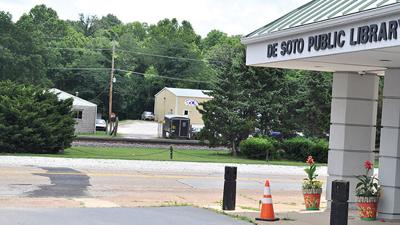The De Soto City Council has approved a $15,729,339 budget that includes funding to construct an Amtrak stop along Main Street. Three sets of preliminary designs for that train platform are being reviewed by Amtrak and Union Pacific.
De Soto’s new budget projects the city bringing in $15,920,350 in revenue, for a $191,011 surplus.
De Soto City Council members voted 4-0 on Oct. 20 to approve the budget for the new fiscal year, which begins Nov. 1 and ends Oct. 31, 2026. Council member Todd Mahn was absent from the meeting.
City Manager Todd Melkus, for a second year in a row, reminded the council that the budget is inflated due to the $2 million allocation for the Amtrak platform and a $1 million allocation in state funding for a St. Louis Street water main project.
Melkus praised finance director Tasha Dennis for her work on the city’s budgets and said due to conservative budgeting, the 2024-2025 fiscal year ended with about 10 percent more in sales tax revenue than anticipated.
“I commend her on our work, and I feel like we have a good budget (for 2025-2026),” Melkus told the council. “I think anytime you stay in the black, I think that’s a good thing.”
According to the new budget, the city will bring in $5,724,350 in revenue for the general operating fund and will have $5,570,358 in expenses in that fund.
The city began this budget year with $8,528,896 in reserves, or undedicated general funds, and is projected to end the year with $8,682,888 in reserves.
Amtrak
In August 2023, the city received news that Amtrak approved a plan to build a De Soto train stop for the Texas Eagle across from the De Soto Public Library.
A total of $2 million was budgeted during the 2024-2025 fiscal year for the platform but since the project has been slow-moving, those funds were carried over to this year’s budget.
The city has allocated $500,000 to the project. Also included in the budget is a $1 million allocation from the state, as well as the $500,000 allocation from Jefferson County’s ARPA funds to assist the city in fulfilling its 50/50 match for the state allocation.
In September 2024, the De Soto City Council entered a contract with Crawford, Murphy & Tilly to help with design, development and engineering for the project.
A few weeks ago, Melkus, council members, County Executive Dennis Gannon, former state Sen. Elaine Gannon, former state Rep. Cyndi Buchheit-Courtway, County Councilman Tim Brown, State Rep. Bill Lucas and Jefferson County Undersheriff Tim Whitney, who plans to run for county executive next year, met with Crawford, Murphy & Tilley and subcontractor Quandel Consultants to look over three preliminary designs that range in cost from an estimated $1.9 million to $2.2 million, Melkus said.
“One (design was presented) with minimal canopies, one with a fairly long canopy that runs along the platform, and one with a canopy and a shelter building, very preliminary designs concerning the structures, but it was overall a productive meeting because everyone was on board with getting these preliminary designs sent off to Amtrak and UP (Union Pacific) so they can start reviewing them,” he said.
Melkus said UP and Amtrak will review the plans and send comments and suggestions to the city. He said he is hopeful the project can be completed in the new fiscal year.
“But this is such a unique project, and it is extremely rare for a new depot to be approved, and so it is hard to say what timeline the review process will be on Union Pacific and Amtrak’s end, but (getting it done this year), that is definitely the goal,” he said.
Melkus said to date, the city has spent just less than $100,000 on engineering and design costs for the project.
Raises
The city’s new budget includes a $2,080 pay raise this year for all its 55 full-time and nine part-time employees, Melkus said.
The council also has approved a $1,500 stipend for all full-time employees.
“For the last four years, the city has paid a retention stipend to all its employees,” said Rich McCane before he resigned as mayor on Oct. 22. “The city invests some reserves, and this stipend is paid out of interest. It’s one of several things that we have done to try to keep folks around. We invest a lot of time into these employees, and money, through training. It’s a competitive job market these days. So, whenever we get veteran police officers, firefighters and public works men and women … we just want them to stick around. We found a good way to do that by investing some money and giving them a stipend.”
Melkus said the stipend will cost the city $84,330 and the raises will cost the city $195,520.
“The council very much understands the constant struggle to retain good employees, and by approving the raises and stipends it helps us to stay in line with other municipalities,” Melkus said.
The city has allocated $4,654,385 for employee salaries and benefits this year.
Capital improvements
Melkus said the city will spend $2 million on capital improvements from the capital sales tax fund and about $629,000 from the water/sewer fund.
Among those improvements is the St. Louis Street stormwater, curb and guttering and street surface improvements, which already is underway, and has been carried over from last year’s budget to the new one. The city received a $1 million Department of Natural Resources grant for that project, Melkus said.
“The street project is estimated to cost $1.3 million,” he said. “The $1 million DNR project is the water main replacement project that is currently taking place, which was required before we could move forward with street improvements. Design and engineering plans are being finalized in the next few months. The goal is to have the project out to bid in early spring if everything stays on track.”
Melkus said $100,000 is budgeted for various park upgrades, and $202,083 is budgeted for a dog kennel addition. He said the city had budgeted $50,000 last fiscal year for the kennel addition but has since come up with a new plan.
“The $50,000 budgeted in last year’s budget for the kennel expansion was not implemented,” he said. “After reviewing the needs of the kennel, it was decided that a larger addition would be more beneficial. Last year, the kennel manager worked with an architect to come up with a better design that fits the city’s needs.”
The budget also calls for several vehicles to be replaced.
“As the city has done for a number of years, we will be adding three new patrol vehicles to the police department’s fleet, at a cost of $165,000, which includes equipment installation and graphics as well,” Melkus said. “The street department was approved to purchase a new bucket truck at a cost of $160,000.”
He said the current bucket truck has been out of service more than it has been in service over the past few years.
“The front-end loader that is over 40 years old has also been approved to be replaced; this machine is used to load trucks with salt and other materials and is estimated to cost $210,000,” Melkus said.
“There is a water main project planned on Blow Street to replace 500 linear feet of 8-inch water main at a cost of $140,000,” he said. “The main sewer project is to replace the sewer main at Cedar Street that crosses the Tanyard Branch and secure it with concrete reinforcements to withstand pressure when the creek rises during rain events. Purchases for the wastewater treatment system include replacing the generator at the treatment plant, which is estimated to cost $150,000, and adding a generator to the stormwater lagoon at a cost of $80,000. We will also be upgrading and replacing the electrical panel system at the Amvets lift station.”
Contract approved
Also at the Oct. 20 meeting, the council voted 4-0 to extend Melkus’ contract as city manager through Oct. 20, 2028.
“I do want to say I appreciate the council for having the confidence in me to renew my contract,” he said.
Melkus said a salary increase was not included as part of the contract extension.
“With that said, when the council votes to give across the board raises, I receive the same increase as every other employee,” he said.
Melkus will be paid a $127,080 annual salary for the new fiscal year, as well as the $1,500 stipend.
He was hired as the city manager in October 2018 after serving as city administrator for Pevely.
Melkus said he is the only city manager in Jefferson County, as all other municipalities have a mayor-council government with a city administrator.
“In a city manager form of government, the manager’s executive role includes managing daily city operations and overseeing all city departments, as well as appointing and removing city employees,” he said. “In mayor forms of government, the mayor holds the executive power and ultimately (is) responsible for city operations while the city administrator makes recommendations to the council and mayor concerning personnel changes, etc.”




